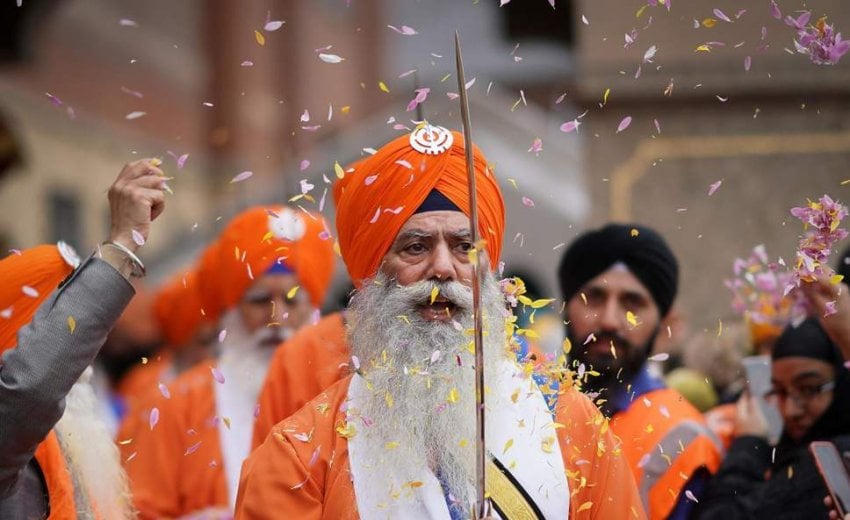
photo credit : sikhnet
Baisakhi, is a famous Punjabi festival observed on April 13th or 14th every year. It signifies the commencement of the harvest season and the advent of a new solar year. In order to take part in the yearly Baisakhi Mela festivities, around three thousand Sikh pilgrims from India have crossed into Pakistan across the Wagah border. Before making their way back to India through Wagah, the pilgrims will pay a visit to Kartarpur, Nankana Sahib, and Lahore, all of which are Sikh holy sites. The Nankana Sahib District administration has made extensive preparations for the pilgrims, covering all aspects like as transportation, lodging, security, medical facilities, and arranging facilities for providing food. The visit of the chief Minister Punjab Maryam Nawaz, on Friday was another good gesture, which shows a didcation to promote religious harmony.
With roots in South Asia’s Punjab area, the Sikh community has a long history and strong international influence. Its core beliefs, which center on human equality and monotheism, have grown into a global religion since its origins in the 15th century. Punjabi is the main language and Gurumukhi script is important in religious writings. The religion is also rich in art, music, literature, and poetry. The Sikh faith has its roots in Pakistan’s Punjab region, where the majority of Pakistan’s Sikhs reside. Pakistan has opened its borders to Sikh pilgrims from India, allowing them to visit holy sites and strengthening ties between the two countries’ Sikh communities.
A historic first for Pakistan, 30000 pilgrims entered over the Wagah border. The Pakistan Sikh Gurdwara Parbandhak Committee greeted the attendees with flowers and garlands, while the Interfaith Harmony Organization presented bouquets. During the three days of celebrations, security will be in place throughout the 17-kilometer route. A lot of planning has gone into making sure that Sikh pilgrims who use the Kartarpur corridor have all they need for their religious observances, including lodging, food, and transportation.
The Baisakhi Mela, a religious event in Indo-Pak Punjab, ended in Gurdwara Sri Panja Sahib in Hassan Abdal. Pakistani Federal Defense Minister Khawaja Asif was the main guest at the event, which gathered thousands of Sikh pilgrims from India, Canada, the United Kingdom, and other countries. Part of the event at Gurdwara Panja Sahib included a Palki procession, which returned sacred scriptures to their proper place. The festival included religious procedures such as the Panja Sahib rites and the holy bath (Ashnan).
The Pakistani government praised the people’s kind welcome as well as the polite performance at all events. Asif emphasized the importance of cultural unity and the upcoming Marriage Act as a solution to a variety of issues. Throughout the festival, the district administration implemented security arrangements, including the deployment of approximately 1,023 police officers and other experts to manage the event.
This day also marks the birth of Sikhism as a religion. Sikhs participate in religious celebrations called Gurudwaras, as well as joyful public processions known as Nagar Kirtans. While celebrating Baisakhi, the Punjabi New Year, farmers offer prayers for a prosperous harvest and good fortune. On this day, Guru Gobind Singh Ji, the tenth Sikh Guru, founded the Khalsa Panth with his teachings. Taking inspiration from Baba Guru Nanak’s life, the event includes a series of spiritual meditations emphasizing the importance of good thoughts and actions. On Baisakhi, Pakistan’s Prime Minister Shehbaz Sharif praised the Sikhs and said that the country’s unique religious and cultural rituals are wonderful. The federal and provincial governments offer facilities for Sikh pilgrims to perform the Baisakhi ceremonies. Sikh pilgrims will bid farewell to Pakistan on April 22, the last day of their spiritual journey.
This is a good gesture by Pakistan’s government to create cultural and religious exclusivity, which is indeed praiseworthy. However, Pakistan has the potential to promote religious tourism, which will boost its economy and score points in the domain of cultural diplomacy.
